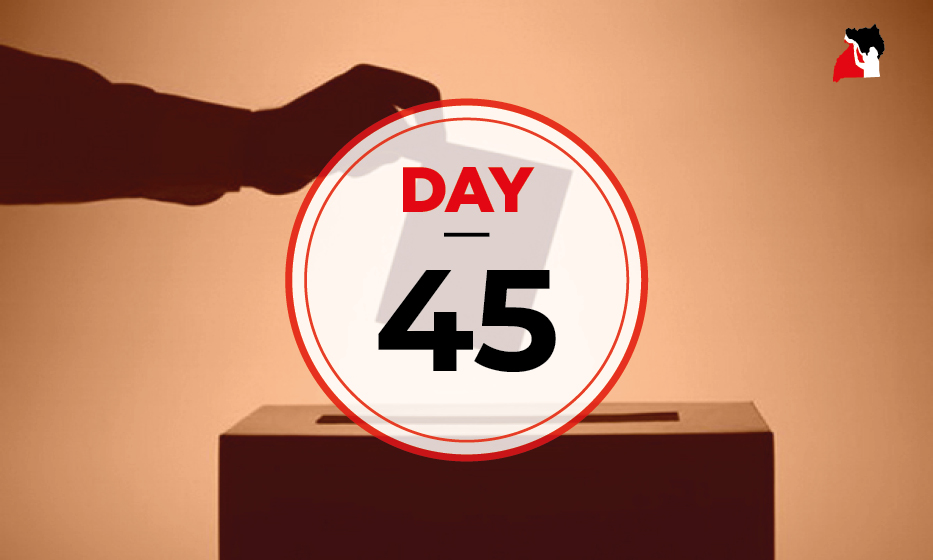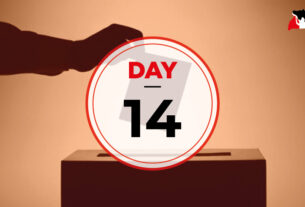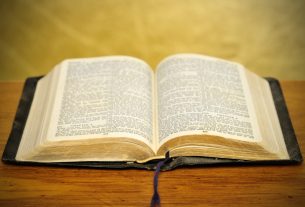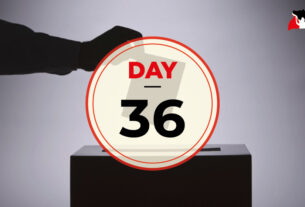FRIDAY, 2nd OCTOBER 2020: THE ELECTORAL COMMISSION
PRAYER GUIDE
ISAIAH 51:15-16 (NKJV)
15But I am the Lord your God,
Who divided the sea whose waves roared—
The Lord of hosts is His name.
16And I have put My words in your mouth; [Emphasis Added]
I have covered you with the shadow of My hand,
That I may plant the heavens,
Lay the foundations of the earth, [Emphasis Added]
And say to Zion, ‘You are My people.’”
JEREMIAH 1:9,10 (ESV)
Then the Lord put out his hand and touched my mouth. And the Lord said to me,
“Behold, I have put my words in your mouth.
See, I have set you this day over nations and over kingdoms,
to pluck up and to break down,
to destroy and to overthrow,
to build and to plant.”
EZEKIEL 37: 3-5, 7, 9, 10
And he said to me, “Son of man, can these bones live?” And I answered, “O Lord God, you know.” Then he said to me, “Prophesy over these bones, and say to them, [Emphasis Added] O dry bones, hear the word of the Lord. Thus says the Lord God to these bones: Behold, I will cause breath to enter you, and you shall live….
So I prophesied as I was commanded. And as I prophesied, there was a sound, [Emphasis Added] and behold, a rattling, and the bones came together, bone to its bone…
Then he said to me, “Prophesy to the breath; prophesy, son of man, and say to the breath, [Emphasis Added] Thus says the Lord God: Come from the four winds, O breath, and breathe on
these slain, that they may live.” So I prophesied as he commanded me, and the breath came into them, [Emphasis Added] and they lived and stood on their feet, an exceedingly great army.
MARK 11:13-14
And seeing in the distance a fig tree in leaf, he went to see if he could find anything on it. When he
came to it, he found nothing but leaves, for it was not the season for figs. And he said to it, [Emphasis Added] “May no one ever eat fruit from you again.” And his disciples heard it. [Emphasis Added]
MARK 11:22-24
And Jesus answered them, “Have faith in God. Truly, I say to you, [Emphasis Added] whoever says to this mountain, [Emphasis Added] Be taken up and thrown into the sea,’ and does not doubt in his heart, but believes that what he says [Emphasis Added] will come to pass, it will be done for him. Therefore I tell you, whatever you ask in prayer, [Emphasis Added] believe that you have received it, and it will be yours.
GUIDING TEXT FOR THE FASTING SEASON
ISAIAH 32:1-8
1Behold, a king will reign in righteousness,
And princes will rule with justice.
2A man will be as a hiding place from the wind,
And a cover from the tempest,
As rivers of water in a dry place,
As the shadow of a great rock in a weary land.
3The eyes of those who see will not be dim,
And the ears of those who hear will listen.
4Also the heart of the rash will understand knowledge,
And the tongue of the stammerers will be ready to speak plainly.
5The foolish person will no longer be called generous,
Nor the miser said to be bountiful;
6For the foolish person will speak foolishness,
And his heart will work iniquity:
To practice ungodliness,
To utter error against the Lord,
To keep the hungry unsatisfied,
And he will cause the drink of the thirsty to fail.
7Also the schemes of the schemer are evil;
He devises wicked plans
To destroy the poor with lying words,
Even when the needy speaks justice.
8But a generous man devises generous things,
And by generosity he shall stand.
Day | Day of the Week | Date | Area of Focus |
WEEK SEVEN | |||
| 45 | Friday | 2nd October 2020 | The Electoral Commission |
| 46 | Saturday | 3rd October 2020 | The Electorate |
| 47 | Sunday | 4th October 2020 | The 2021 Elections |
| 48 | Monday | 5th October 2020 | Post- Election to Swearing-in |
| 49 | Tuesday | 6th October 2020 | Marketplace Restoration |
CONCLUSION | |||
| 50 | Wednesday | 7th October 2020 | Dedicating the Decade 2020 -2029 |
| Thursday | 8th October 2020 | Dedicating 2020/2021 | |
| Friday | 9th October 2020 | THANKSGIVING |
DATES TO NOTE
CONCLUDING VIRTUAL CONFERENCE
Monday, 5th October to Wednesday, 7th October 2020 (7 pm to 9 pm)
CONCLUDING NIGHT VIGIL & DEDICATION OF 2020/2021
Thursday, 8th October 2020
THE ELECTORAL COMMISSION
In the Bible, apart from the people being asked to choose their leaders following prescribed guidelines by Moses, in Deuteronomy 1:13 and the Apostles, in Acts 6:3, there are not many references to choosing leaders by the populace. There are however several references to casting lots. Casting lots appears several times in the Bible: Esther 3:7 to determine a date, Numbers 26:55 to divide land, I Samuel 14L42 to find a guilty person, 1 Samuel 10:21, 22 and Acts 1:26 to choose a leader. Casting lots in the ancient world was more like drawing names from a hat than voting. The tradition existed and still exists in cultures and religions around the world. The names of the candidates would have been written down (or something done to mark the lots), and then would be drawn from a vase, urn, or other large item. They might have been dumped out with the one landing first being named the choice.
However, research has also shown that casting lots in the ancient world in some cases could have been a multi-cast affair. The lots would be cast repeatedly until the same lot fell out three times in a row. Only then was the lot seen as showing God’s will. If the lots were cast ten times without a three-in-a-row win, then it was deemed that God had selected neither choice.
As the disproportionate role of money, power and gerrymandering grows in elective politics around the world, some are beginning to wonder whether casting lots (cleromancy) would be a better option. Of course to the modern critically inclined minds this sounds crazy but some election results are even crazier, either due to the choices people make, or to the tampering that sometimes happens with electoral processes.
Historically, Uganda is among the few African countries with a heritage of kingdoms and chieftainships characterized by centralized leadership systems. Under this system, hereditary leaders administered their societies through institutionalized councils, for example the Lukiiko in Buganda Kingdom, or the Orukurato in Bunyoro and Tooro kingdoms (assemblies that had representatives drawn from each clan and other royal appointees), and the Council of Elders in other pre-colonial communities.
In either case, the representatives had to meet prescribed criteria to qualify to rule or represent the people. Hence the concept of legitimacy of leadership is not a new concept. However, elections have since become the basis of ensuring legitimacy of government, as those who are governed express their consent through (regular) elections.
The practice of leaders assuming office through elections in Uganda can be traced to pre-independence period, when the British colonial government made a statute that allowed Africans to participate in local elections starting with the Legislative Council (LEGCO) which was a precursor to Uganda’s independence in 1962.
Parliament enacted the Electoral Commission Act in May 1997, hence establishing a permanent and independent election management body to organise, conduct and supervise elections and referenda. This marked a significant achievement for the revival of democratic governance in Uganda. The EC Act provided for appointment of a Commission comprising seven members, to serve for a seven-year term, which could be renewed only once.
Although Ugandans have accepted electoral systems as the means of determining leaders to electoral offices, there remains several challenges in achieving successful electoral democracy.
For example, public perception of the importance of elective offices has resulted into high turn up for Presidential and Parliamentary Elections and apathy for the Local Government Elections. This is regrettable, especially considering the high cost of organizing elections.
Weak internal democratic practice within electoral parties and organisations remains a big challenge to realization of benefits of a pluralistic electoral system.
Some sections of the electorate also harbour a negative perception that the Electoral Commission is partisan and do not give expected support to its programmes and activities, which results in apathy.
The Electoral Commission is established under Article 60 of the 1995 Constitution of the Republic of Uganda, and is mandated under Article 61 of the 1995 Constitution of the Republic of Uganda (as amended) to:
- Ensure that regular, free and fair elections and referenda are held;
- Organize, conduct and supervise elections and referenda in accordance with the Constitution;
- Demarcate constituencies in accordance with the provisions of the Constitution;
- Formulate and implement voter educational programmes related to elections;
- Compile, maintain, revise and update the voters’ register;
- Hear and determine election complaints arising before and during polling; and,
- Ascertain, publish and declare in writing under its seal the results of the elections and referenda.
As an independent body, the Constitution mandates the Commission to be free from any direction or control of any person or authority in the performance of its functions (Art. 62). The Constitution also directs Parliament to ensure that adequate resources and facilities are provided to the Commission to enable it effectively discharge its mandate (Art. 66).
- Organising, conducting and supervising various elections and referenda;
- Compiling, maintaining, revising and updating:
- The National Voters’ Register on a continuous basis
- The various registers for Special Interest Groups
- Producing and issuing voters’ cards;
- Compiling and updating the various Voters’ Registers for Special Interest Groups and Administrative units;
- Developing effective civic education programmes related to elections;
- Reviewing all electoral laws in order to come up with appropriate recommendations on amendments;
- Recruiting qualified personnel and training them in the management of elections;
- Hearing and determining election complaints arising before and during polling; and
- Demarcating of constituencies and electoral areas.
SCRIPTURES FOR PRAYER AND PROCLAMATION
DEUTERONOMY 1:13-15
Choose for your tribes wise, understanding, and experienced men, and I will appoint them as your heads.’ And you answered me, ‘The thing that you have spoken is good for us to do.’ So I took the heads of your tribes, wise and experienced men, and set them as heads over you, commanders of thousands, commanders of hundreds, commanders of fifties, commanders of tens, and officers, throughout your tribes.
1 SAMUEL 10:20,21
Then Samuel brought all the tribes of Israel near, and the tribe of Benjamin was taken by lot. He brought the tribe of Benjamin near by its clans, and the clan of the Matrites was taken by lot; and Saul the son of Kish was taken by lot…
PROVERBS 18:18 (NLT)
Casting lots can end arguments; it settles disputes between powerful opponents.
PROVERBS 16:33 (MSG)
Make your motions and cast your votes, but GOD has the final say.
PROVERBS 11:1 (CEV)
The LORD hates anyone who cheats, but he likes everyone who is honest.
PROVERBS 29:2
When the righteous are [increased] in authority, the people rejoice; but when the wicked rule, the
people mourn.
WORSHIP GOD WHO ULTIMATELY CHOOSES LEADERS
ROMANS 13:1
Let every person be subject to the governing authorities. For there is no authority except from
God, and those that exist have been instituted by God.
DANIEL 2:21
Daniel answered and said:
“Blessed be the name of God forever and ever, to whom belong wisdom and might. He changes times and seasons; he removes kings and sets up kings; he gives wisdom to the wise and knowledge to those who have understanding
Psalm 75:6,7
For not from the east or from the west and not from the wilderness comes lifting up,
but it is God who executes judgment, putting down one and lifting up another.
THANK GOD FOR:
- The leadership at the Electoral Commission.
- The many successes the Electoral Commission as registered since its inception.
- It has been able to successfully compile, maintain, revise and update the National Voters’ Register.
- In 1980, Uganda had a handwritten register that could only be used once; however, since 1993, the register has undergone computerization to enable easy updating, use and maintenance.
- In 2001, Uganda adopted use of a photograph-bearing Register, which improved voter identification, and effectively reduced the problem of impersonation during voting.
- In April 2010, the government, through the Ministry of Internal Affairs, started implementation of the National Security Information System (NSIS) Project, designed to register all citizens and issue them with identification cards. The project started with voter registration in preparation for the 2011 General Elections, conducted and supervised by the Electoral Commission, and its results have already increased the credibility of the voters’ roll.
- Civic education programmes relating to elections have been formulated and implemented, increasing awareness on rights, duties and responsibilities, before, during and after elections, which is critical in achieving peaceful, free and fair elections.
- Integration of technology in election management has ensured efficient and effective delivery of electoral services. In 2011, the EC launched an SMS service to enable registered voters confirm the details of their polling stations from a mobile phone. A text version of the register was also uploaded on the EC website to enable voters with access to the Internet to confirm their registration status.
PROCLAMATION OVER THE ELECTORAL COMMISSION
A Declaration Of What We Are Praying For And What We See As God Answers Prayer
God is raising righteous and just leadership for the Electoral Commission now and in the
unfolding years.
Righteousness, justice, mercy, and truth will be established as pillars of the electoral process.
These leaders will be as a hiding place from the wind and a cover from election storms.
They will be a source of refreshment and renewal for Uganda’s electoral system
as rivers of water in a dry place.
They will be a covering from the heat of elections just like
the shadow of a great rock in a weary land.
There will be servant leaders that will primarily exercise their leadership as servants of the
populace.
The righteous will flourish in places of electoral authority and Ugandans will rejoice and not mourn
or groan.
At all levels of the electoral process there will be a hatred for wrongdoing.
Those tearing down our nation during elections by giving and receiving bribes will be scattered. The judgment of God will come upon the wicked in elections and they will be removed – the idolaters, corrupt, immoral, murderers, opportunists, liars, evil counselors, thieves who change poll results and tamper with voters registers.
God will deliver Uganda from wickedness and injustice in the electoral system.
The corridors of power to the Electoral Commission office and other electoral offices will be locked up spiritually for idolaters; the corrupt; those who practice iniquity and ungodliness; those who utter error against the Lord; those who scheme evil and devise wicked plans to destroy the poor with lying words; those who keep the hungry unsatisfied; and those who cause the drink of the thirsty to fail.
Electoral officials who worship and abuse money will be judged, instead the generous and upright will stand and the righteous will flourish in the Electoral Commission and other electoral offices.
Through the leadership of the Electoral Commission the eyes and ears of Ugandans will open up so that our eyes will not be dim, neither will our ears be dull. Those who are rash, careless and ignorant will gain understanding of knowledge, and the tongue of the stammerers will be trained to speak plainly.
Wisdom and honor will have true meaning in the electoral system.
Foolishness and wickedness will be despised and overthrown.
All electoral officials will be mindful of their accountability to God the King, who they are called to
represent.
In 2021 and the unfolding years, the Electoral Commission will execute its mission: “to organize
and conduct regular free and fair elections and referenda” professionally, impartially,
efficiently and in the fear of God.
The Electoral Commission will uphold its constitutional mandate and perform its functions in a
bold, non-partisan way without influence from interested parties within and without the
country.
There will be a clear un-tampered National Voters’ Register and the printing of ballot papers
will be done with excellence to enable the electorate to vote without confusion.
The packing, delivery and distribution of the polling kits will be done efficiently: with no
miscoding and misallocation of polling kits.
The Electoral Commission will be a fair umpire and enforcer of the rules and regulations
governing the campaign periods.
Players in the electoral spaces both for National and other elections will have mutual respect for
each other.
Uganda will have an efficient and effective electoral system with peaceful elections and peaceful
transfers of power from one administration to the next.
AMEN



